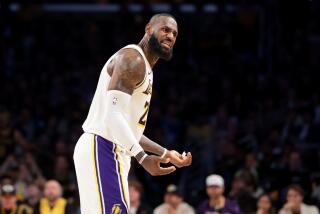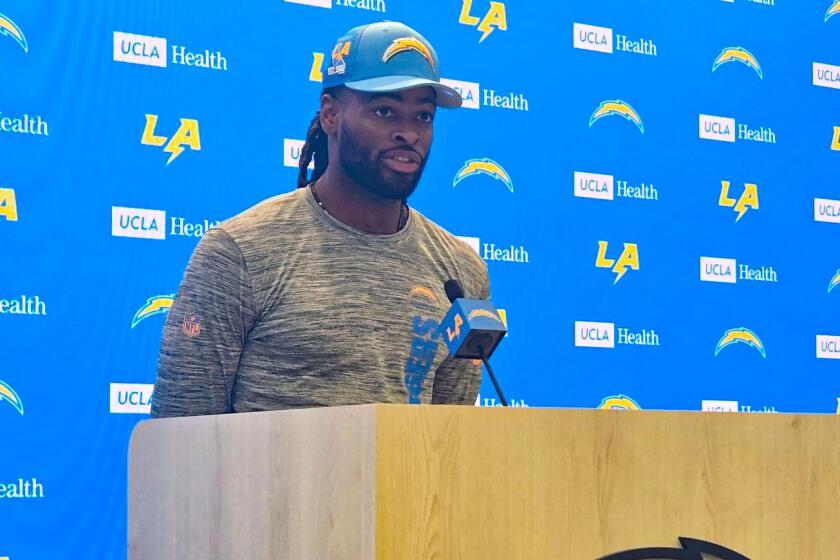HOT ON THE TRIAL
- Share via
PORTLAND, Ore. — To truly understand the Portland Trail Blazers, you have to start with the player who exemplifies all that is good and bad about them.
Isaiah Rider is a guy who spent the waning moments of Game 1 of the second-round series against the Utah Jazz searching for some candy in a courtside bag. This was while he was checking into the game.
He arrived for one postgame news conference holding his denim jeans up with one hand, asking the assembled media, “Any of y’all got a belt? I forgot mine.” He left that news conference and walked into a supply closet, thinking it was the exit.
Two hours before Game 6, someone in the Portland locker room asked about Rider’s whereabouts and was told he was in the back, sleeping.
He is the closest thing the team has to a go-to player. Rider scored 11 points in the fourth quarter of Portland’s victory in Game 2 and afterward he said: “I want the ball, I want the pressure.”
Yet two games later he told Portland Coach Mike Dunleavy to run plays for someone else in the second half, before teammate Brian Grant came up to Rider and said, “We need you.”
Rider responded with eight points in the fourth quarter, and Portland won. He made 10 free throws (part of a 14-for-14 performance overall) in the final quarter of Game 6 Thursday night as the Trail Blazers closed out the series.
Rider proved to be a good finisher. It’s getting there at the start that seems to be his problem; he has missed or arrived late at a slew of practices and shootarounds during his three seasons in Portland. There were also the times he was arrested and charged with possession of illegal items ranging from marijuana to cellular phones.
It’s the good Rider who has been on display during these playoffs. No issues, no hassles.
“I don’t have nothing to say or prove no more,” Rider said. “I don’t know what to tell you, man. I mean, I’m me. I’ve made mistakes early on. I play this game well. I’ve been demanding double-teams my whole career. Basketball-wise, I’ve had a great career. It matches up to all the superstars in the league. Now is just the time to rid the problems.”
His only problem these days seems to be staying within the realm of reality. A career average of 18 points per game does not match up to all the superstars in the league. And making conference finals is not grounds for throwing your jersey into the stands and whipping the crowd into a frenzy, the way Rider did after the Trail Blazers knocked off the Jazz.
“This is big,” Rider said. “This is the farthest I’ve ever been in my career. So I was hyped.”
It’s the deepest the Trail Blazers have advanced since they made the NBA finals in 1992, ending a string of six consecutive first-round exits in the process.
It has been a year of progress all around for the Trail Blazers. They improved their tarnished off-court image and even had a player (Grant) receive the J. Walter Kennedy Citizenship Award.
Dunleavy won the coach-of-the-year award. If nothing else, he deserved some kind of award for merely getting through the season on a team with Rider and other emotional players such as Rasheed Wallace. You’ve never heard a team mention not getting upset with the referees as one of the keys to victory.
Dunleavy’s Trail Blazers beat the Jazz primarily thanks to tough defense, which is sometimes a foreign concept to young teams.
“I don’t think that was a tough sell,” Dunleavy said. “Our guys know that if you can defend and you can rebound, you’re going to win some games.”
How about his concept of regularly using 10 players?
“I think that was a little harder,” Dunleavy said. “It’s always an ongoing process.”
During the regular season, Dunleavy had nine starting lineups, 10 Trail Blazers averaged 12.7 minutes or more, and seven averaged more than 21 minutes. Point guard Damon Stoudamire led the team with an average of 33.5 minutes per game, and he’s probably the unhappiest with the situation. In a peculiar substitution pattern, Greg Anthony often plays the first nine minutes or so of the fourth quarter and Stoudamire comes in to finish up, and it was Anthony’s defense against John Stockton that keyed Portland’s disruption of the Jazz offense.
When the Lakers took apart the Trail Blazers in two victories at the Forum--part of a stretch of four losses in the final five games of the season--it seemed to announce that the Lakers were ready for the playoffs and the Trail Blazers were about to collapse. We all know what happened to the Lakers, but how did the Trail Blazers turn things around?
“Part of our end-of-season ‘collapse’ was a misnomer,” Dunleavy said. “We played some tough games against some very good teams--back to back and on the road. And, except for the two losses at L.A.--our worst defeats of the year--I thought we were playing pretty well in some of those games. I told our guys that you can’t start believing what people are writing about our collapse. We’re good, and I kept telling our guys that we need to believe that we’re good.”
This team seems to spend a lot of time over what’s written about it. Despite nothing worse than standard critiquing of the team by its hometown paper, the Oregonian, the Trail Blazers decided to celebrate their victory over Utah in Game 2 by gathering in the locker room and chanting: “[Bleep] the Oregonian!”
They know everyone’s waiting to see what will happen when they’re pushed to the edge, waiting for the inevitable implosion from the mix of youth and suppressed egos (read: minutes).
“There are opportunities for every team to crack,” Anthony said. “It didn’t, it hasn’t and it won’t [happen]. We just buy into winning. Regardless of what goes on externally.”
With this team, it’s the internal goings-on that make it interesting.
Right, Isaiah? Uh, anybody seen Isaiah . . . ?
J.A. Adande can be reached at his e-mail address: j.a.adande@latimes.com.
TODAY
Western Finals
Portland at San Antonio. 2:30 p.m., Channel 4
Capsule, Page 4
More to Read
Go beyond the scoreboard
Get the latest on L.A.'s teams in the daily Sports Report newsletter.
You may occasionally receive promotional content from the Los Angeles Times.










